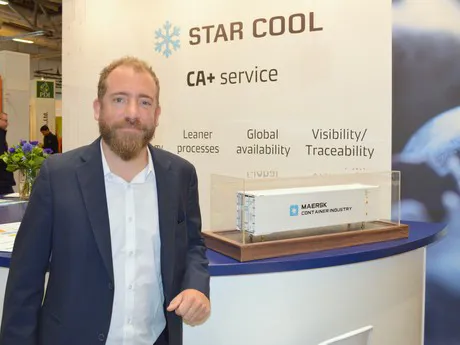While the container market reported an average annual growth of two per cent in the past five years, the reefer market grew by five to six per cent. This year, expectations for reefers are also looking well. Benjamin Vicuna, CA operations manager of Maersk Container Industries (MCI), talks about the developments in Controlled Atmosphere (CA) containers.

Benjamin Vicuna, CA operations manager of Maersk Container Industries (MCI).
The growth in the reefer category is due to new trade flows. Twenty years ago, blueberries weren’t shipped across oceans, according to Benjamin. “That’s also true for the Chilean cherries that are shipped before the Chinese New Year. The international market is growing enormously.” In the wake of a globally growing demand for other fruit, demand for reefers is rising as well. From countries that traditionally exported via lorries, such as Spain and Mexico, demand is increasing now that these countries are starting to export to Asia.
Growing market for reefer containers
MCI is part of Maersk’s Manufacturing segment, and builds the reefer containers. These containers are also supplied to other shipping companies to a large extend. “As builder of these containers we have a good idea of the challenges our clients are faced with,” Benjamin says. “We predict a stable increase in the conditioned containers and in the switch from bulk to containers.” This is supported by the general developments on the market. The average age of reefer boats is 28 years and new conventional reefers are nearly no longer launched. The average growth figures of five to six per cent over the past five years emphasise this expectation.
The technology supports this growing demand. Controlled Atmosphere is a specialised technique to keep the atmosphere under control during transport. “It’s becoming increasingly important to know what happens to the product,” Benjamin explains. “There is an increasing demand for produce like blueberries and avocados which need extra care for arriving with good shelf life to distant destinations. We in MCI can provide the equipment and the knowledge to deliver specific conditions to the different fruits.”
Data increasingly important
Besides the alarm function of the sensors, a wealth of information is gathered as well. “A lot of information is gathered, but not a lot is done with this yet. The next step is to cross-reference this data and to draw conclusions in order to improve the quality of the products,” Benjamin says. More and more traders also see the benefit of this data. MCI will be entering the connectivity market with a system called Sekstant® Global Guidance this year. Sekstant will provide a range of value adding services based on the operational data transmitted wirelessly. Liner companies could even decide to use it to build something similar to Remote Container Management (RCM), the product currently offered to customers shipping with Maersk. The machine data provided by the technology will however not only benefit operators but also enable MCI to further drive the evolution of its products.
Saving energy boosts reefer market
Sustainability is also a theme on the agenda in shipping. Benjamin sees a task for MCI in this as well: “We can help reduce the use of energy by making the cooling machines use less energy. The Star Cool concepts build on energy optimised operation of the compressor and cooling circuit.” For shipping companies, more will change in the coming years. “One of the most important reasons the bulk segment existed as long as it did, is the low bunker prices of recent years,” Benjamin explains. “Rising fuel costs and IMO sulphur regulations that will become active in 2020 are expected to result in an acceleration of the switch.”
Shipping companies have different options to meet the new regulations, varying from switching to natural fuels such as LNG or using scrubbers (air purification installations). No matter which route the shipping companies choose, costs will rise. Costs for generating electricity to provide the reefers on board with energy will also rise. Benjamin calculates: an actual increase of 45 per cent in fuel costs will increase price per kWh for reefer operation by the same degree to about 0.16 USD “The most recent reefer techniques can help shipping companies to absorb costs. By using StarConomy, temperature control software, for instance, that controls both the compressor and the fan speed. Technology like this is not only good for the economy, but also the environment as carbon footprint is reduced simultaneously.”
For more information:
Maersk Container Industry
Janina von Spalding
T: +453 363 19 79
E: janina.vonspalding@maersk.com
W: www.mcicontainers.com
